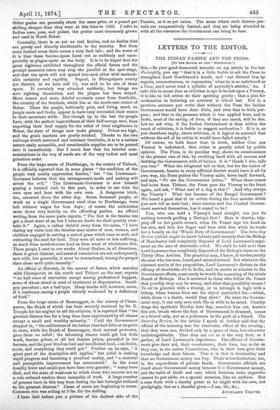LETTERS TO THE EDITOR.
THE INDIAN FAMINE AND THE PRESS.
[TO THI EDITOR OF THE " SPEOTATOR.1 Sin,—In your good-humoured remarks on my article in the last Fortnightly, you say " that it is a little feeble to ask the Press to strengthen Lord Northbrook's hands, and ' not distract him by regrets, remonstrances, or reproaches,' when he is as unfettered as a Czar, need never read a syllable of anybody's articles," &c. I take this to mean that as criticism is apt to be lost upon a Viceroy, it is idle to bid critics do their spiriting gently ; that a plea for moderation in lecturing an autocrat is labour lost. But in a previous sentence you write that without the Press the Indian Government would have done little, and even that to little pur- pose ; and that to the pressure which it has applied here, and in India, most of the saving of lives, if they are saved, will be due. Let me ask why, if the Indian Government is thus within the reach of criticism, it is feeble to suggest moderation ? If it is, as you elsewhere imply, above criticism, is it logical to contend that without the aid of its critics it would have failed utterly ?
Of course, we both know that, in truth, neither Czar nor Viceroy is unfettered, that either is greatly ruled by public opinion. The Press, in its peculiar way, shows its consciousness in the present case of this, by crediting itself with all success and debiting the Government with all failure. It is "Heads I win, tails you lose." When the telegrams tell us that, but for the action of Government, famine in every afflicted district would have it all its own way, the Press pushes the Viceroy aside, bows itself forward, and says, "We are the Government action." When there comes bad news from Tirhoot, the Press pass the Viceroy to the front again, and ask, " What sort of a dog is this?" And why always the Viceroy ? What has become of the Bengal Government ? We heard a good deal of its action during the four months which you now tell us were lost ; since success and the Central Govern- ment asserted themselves, has it ceased to be ?
You, who can hold a Viceroy's bead straight, can you do nothing towards guiding a Bishop's feet ? Here is charity, trip- ping off on her gentle errand, when Dr. Fraser lays his hand on her arm, and bids her linger and bear with him while he reads- her a homily on the Whole Duty of Government.' The Saturday Review (which ought to know better) said recently that the Bishop of Manchester had completely disposed of Lord Lawrence's argu- ment on the uses of charitable relief. We shall be told next that Lord Lawrence has completely disposed of the Bishop's views on the Thirty-Nine Articles. The practical man, I know, is too frequently the man who has seen, heard,and misunderstood. But whatever the abstract merits of the proposition, Lord Lawrence's dictum on the efficacy of charitable aid in India, and its merits in relation to the Government efforts, must surely be worth the reasoning of the whole Bench of Bishops. Has it occurred to those who follow Dr. Fraser that possibly they may be wrong, and what that possibility means? To err in practice with a viceroy, or to triumph in logic with a bishop, when human lives are the object contended for,—which, while there is a doubt, would they elect ? Do what the Govern- ment may, it can only save such life as wills to be saved. Charity drags the apathetic Hindoo into day, searches him out, worries him out, treads where the foot of Government is shunned, comes as a friend only, not as a policeman in the garb of a friend. The Saturday Review, in the article I speak of, further said that the official of the morning was the charitable officer of the evening ; that they were one, divided only by a space of time, but otherwise undistinguishable. That they are not so is the very fruit, as I gather, of Lord Lawrence's experience. The officers of Govern- ment give their aid, their countenance, their time, too, as far as they can, to the native Committees, who in their turn give their knowledge and their labour. This it is that is invaluable; and that no Government money can buy. There is less hesitation, too, in the expenditure of private funds. Government officials are timid about Government money because it is Government money, and the habit of thrift and care which business rules engender cannot be put aside, on a special occasion, like an uniform. But a man deals with a charity purse as he might with his own, not grudgingly, but as a cheerful giver.—I am, Sir, &c., AUCKLAND COLVIN.


































 Previous page
Previous page